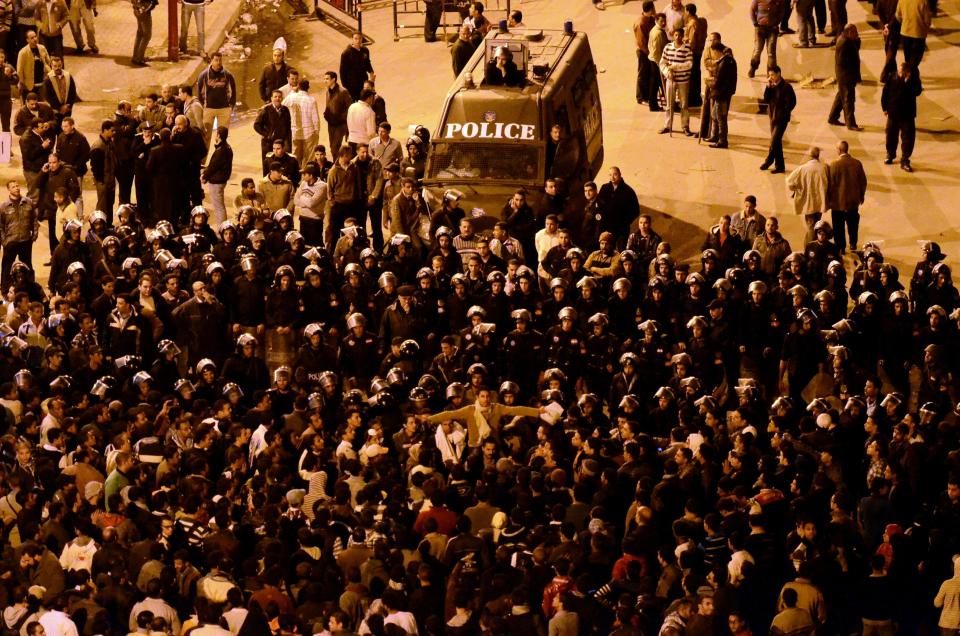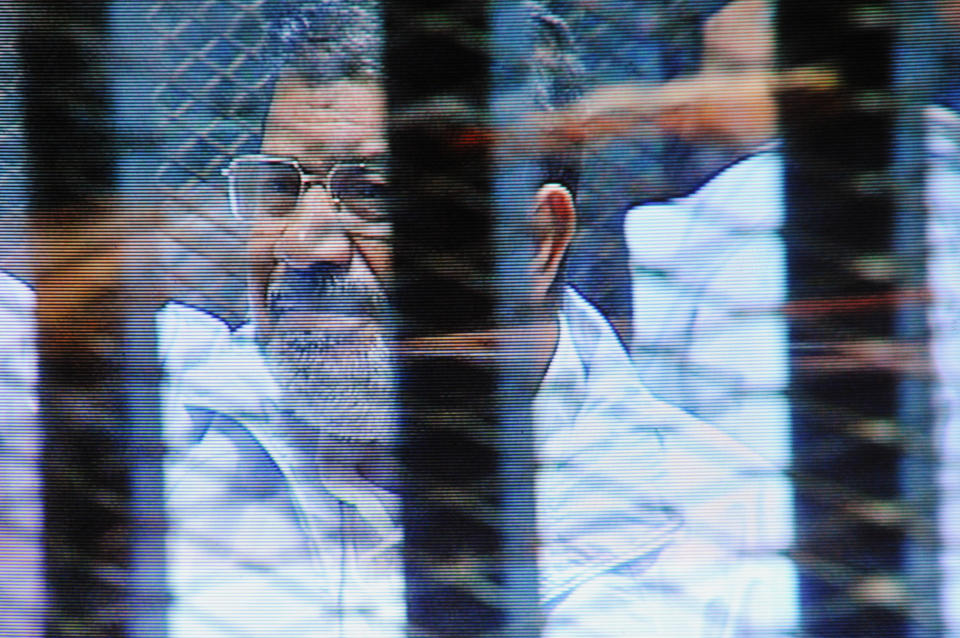Egypt: Police officers acquitted of 2011 killings
CAIRO (AP) — An Egyptian court acquitted six police officers Saturday on charges of killing 83 protesters during the country's 2011 revolution, the latest in a string of trials that rights group say failed to hold the country's security forces accountable for demonstrators' deaths.
The acquittals come as ousted Islamist President Mohammed Morsi, toppled in July by the military, faces a host of criminal charges. Morsi appeared Saturday in court and shouted from inside a soundproof defendants' cell, urging his supporters to continue protests and vowing to try the country's military chief and Republican Guards commander for killing his supporters.
The police officers' case involved the killing of protesters in the Mediterranean city of Alexandria and included the former head of security in the city and of the riot police. Prosecutors alleged that commanders armed police with live ammunition and allowed officers to shoot at protesters in front of police stations from nearby rooftops.
Lawyers for the officers denied that they were responsible for the killings. During a Jan. 19 hearing, lawyers referred to Morsi's Muslim Brotherhood group as the "real killers" of the protesters, the state-run daily newspaper Al-Ahram reported.
Police brutality during autocrat Hosni Mubarak's nearly 30 years in office was a key cause of the 2011 uprising. However, Morsi failed to reform the force and instead used them to violently curb his opponents' protests. Since his ouster, thousands have been killed and injured in heavy security force crackdowns on Morsi's supporters.
Given the chaos surrounding the 2011 uprising, legal experts say it is difficult to hold any individual legally responsible for a specific killing. However, rights activist say no police officers charged with killing protesters in 2011 is behind bars, leading them to accuse Egypt's judiciary of protecting security forces at the expense of justice.
"The consecutive regimes did not have the political will to hold the criminals accountable, allowing them to go away with it," said rights lawyer Ahmed Ezzat, who works with the prominent Freedom of Though and Expression group. "These acquittals strengthen (Mubarak's) position. ... Now we have the interim authorities putting it all again on Morsi."
"Policemen who are acquitted come out of detention fiercer," Ezzat said. "They will kill more protesters."
Lawyers for the police officers charged could not immediately be reached for comment Saturday.
Morsi appeared in a Cairo courtroom Saturday with some 20 others over a case known in the Egyptian media as "the great escape," in which he is charged with some 130 others over prison breaks that freed some 20,000 inmates during the 2011 uprising.
The majority of those charged— including militants from the Palestinian Hamas group and the Lebanese militant group Hezbollah — are being tried in absentia. Morsi himself was freed in one of the prison breaks before becoming the nation's first freely elected president a year later.
Morsi and the defendants remained locked in the soundproof cell in the courtroom, though they chanted "down with the military rule" and "the people salute the president's steadfastness," according to a report by Egypt's state news agency MENA.
Mohammed Abu-Leila, a lawyer of Mohammed el-Beltagy, a top Brotherhood member charged in the case with Morsi, said that he sarcastically asked the court to give him time to learn sign language to be able to communicate with his client through the glass.
"It is as if we are in a monkey's jungle," he angrily said after the session was over.
Abu-Leila also complained about the illegally recorded conversation between Morsi and his lawyers leaked to the press earlier this month. Audio clips of the conversations posted online by the private daily newspaper el-Watan allegedly had Morsi concurring with what his lawyer suggested was the uselessness of both protests and subsequent security crackdowns. The Brotherhood's office in London later denied that Morsi spoke against the protests.
The trial has been adjourned to Monday as lawyers requested the case be transferred to a panel of different judges. After the hearing, security officials said that authorities took Morsi to Cairo's Scorpion prison at Torah instead of the heavily-fortified prison of Borg el-Arab near Alexandria where he has been held. Morsi is scheduled to appear in court again Sunday for another case. The officials spoke on condition of anonymity because they were not authorized to speak to journalists.
The Muslim Brotherhood has been designated as a terrorist group by Egypt's military-backed interim government and thousands of its supporters, members and its leaders have been arrested, killed and injured in a crackdown since Morsi's overthrow.
Meanwhile Saturday, a court sentenced 15 youth protesters to two years in prison and 50,000 Egyptian pound (nearly $7,100) fines for protesting without a permit in January. The youth are known as Ultras Revolutionaries, taking its name from soccer fans known as Ultras Ahlawy, who were among the youth groups that joined the 2011 uprising against Mubarak and demonstrations against Morsi.




